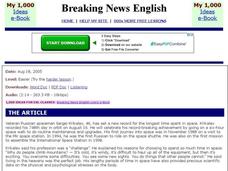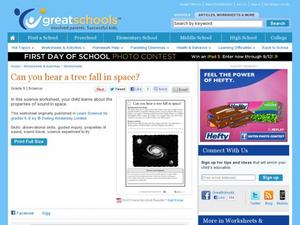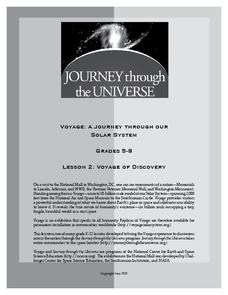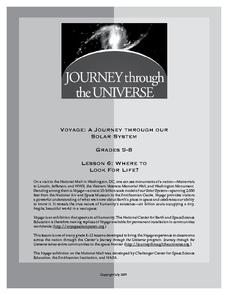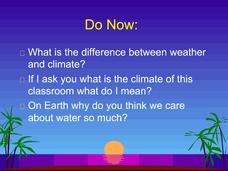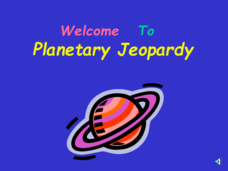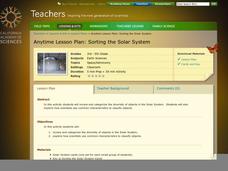Laboratory for Atmospheric and Space Physics
Space Travel Guide
Looking to take a trip? Why not go to space? Here, scholars take on the role as travel agent to create a guide to their favorite planet including travel tips and sightseeing recommendations.
Messenger Education
Mission: Possible—How Can We Plan an Exploration of Another World?
An astronaut's spacesuit weighs 280 pounds and takes 45 minutes to put on — that's a serious suit! The second activity of a three-part series allows pupils to see all that goes into space exploration. Through simulations, groups analyze...
Curated OER
Breaking News English: Space Station
In this space station activity, students read the article, answer true and false questions, complete synonym matching, complete phrase matching, complete a gap fill, answer short answer questions, answer discussion questions, write, and...
Curated OER
Mission Complete, Houston
It was a bittersweet event when the space shuttle Atlantis touched down for the last time on July 21, 2011. Space science learners read an article about this event in The New York Times and then write answers to who, what, where, when,...
Curated OER
Can You Hear a Tree Fall in Space?
How does sound travel in space? Fifth graders investigate this question with a science activity, in which they research the properties of sound. Schedule a lab visit for individual Internet research, or include the activity after you...
NASA
Cleaning Water
From their sweat to the water vapor in their breath, astronauts recycle every possible drop of water while in space. After watching a short video describing the different ways materials are recycled and reused in space shuttles, young...
K5 Learning
Space Based Astronomy
How much astronomy can you study with the naked eye? Learn more about the ways scientists explore the galaxy with a short reading passage and set of short-answer questions.
Berkshire Museum
Camouflage!: Collecting Data and Concealing Color
Help young scholars see the important role camouflage plays in the survival of animals with a fun science lesson. Starting with an outdoor activity, children take on the role of hungry birds as they search for worms represented by...
Laboratory for Atmospheric and Space Physics
Looking to the Future
New Horizons set forth on a mission to Pluto in 2006. Ten years later, the spacecraft is still on its way. Here, enthusiastic scholars predict what they will be like—likes, dislikes, hobbies, etc.—when New Horizons arrives at its...
Journey Through the Universe
Voyage of Discovery
Did you know that Pluto is smaller than the United States of America? It is difficult to conceptualize the size of planets and the distance between them, and the lesson addresses those exact issues. After a discussion, pupils create...
Journey Through the Universe
Where to Look For Life?
Every year we discover new planets including more than 1,000 in 2016 alone. Will we ever find life on another planet? The lesson includes two activities to help scholars understand this concept. First, they analyze the temperature range...
NASA
Soda Straw Rockets
Three, two, one, blast off to a better understanding of force and motion with this exciting science lesson! Beginning with a discussion about rockets and gravity, young scientists go on to complete a series of worksheets about net forces...
Laboratory for Atmospheric and Space Physics
Where Are We Going?
Come take a ride on the space bus! Scholars go on an imaginary trip to pick up their peers from the inner and outer planets while reinforcing math skills. First, learners round decimals to identify each planets' distance from Earth....
Laboratory for Atmospheric and Space Physics
Charting the Progress of New Horizons
In 2006, New Horizons began its mission to fly to Pluto. As it continues its journey, scholars track its progress with the help of an informative website, all the while reinforcing measurement concepts with the construction of a scaled...
Laboratory for Atmospheric and Space Physics
Planetary Distances on the Playground
There's no need to stay inside; get out of the classroom and create a scaled map of the solar system on your playground field! In collaborative groups, scholars identify the distance between the sun and other planets, place planet...
Messenger Education
Exploring Exploring
The reason people first began trading was because of their desires for objects other societies possessed. In the activity, classes discuss why exploration has been a common thread in all societies and where these desires have taken...
Berkshire Museum
Adopt a Schoolyard Tree
Help young scientists connect with nature and learn about trees with a fun life science lesson plan. Heading out into the school yard, children choose a tree to adopt, taking measurements, writing descriptions, and drawing sketches of it...
Port Jefferson School District
Water and Climate
Dive into a lesson on the hydrosphere with this Powerpoint presentation. Building on prior knowledge of the water cycle, young scientists learn what happens to water after it falls as precipitation and explore the different factors...
Curated OER
It's a Matter of Space (cont.)
In this science experiment worksheet, young scholars investigate the properties of matter and what happens if two kinds of matter try to take up the same space. Students follow the detailed instructions which take the format of the...
Windows to the Universe
All About Magnetism
Enjoy magnets and space science with a fun worksheet. With a word search, a coloring page of Jupiter, and a connect-the-dots activity, kids are sure to learn about magnetism and astronomy.
Minnesota Literacy Council
Scientific Method
Here is a resource with a descriptive approach to explaining the scientific method. It's simple, but effective for both introduction and reinforcement of this concept.
Curated OER
Planetary Jeopardy!
Space Science can be so much fun, especially when you play Planetary Jeopardy! This game tests students on what they know about Roman Gods, the planets and moons in our solar system, and the Earth's rotation.
Curated OER
Tilted Earth
What causes Earth's seasons? Find out through a series of anticipatory questions, an easy yet powerful activity representing the sun-Earth system, a diagram to label, and follow-up questions. Dispel the misconceptions about Earth being...
California Academy of Science
Sorting the Solar System
Scientists are always sorting and classifying objects based on their characteristics. In a hands-on learning activity, young space explorers work together to categorize solar system cards based on their properties. It is up to the young...




